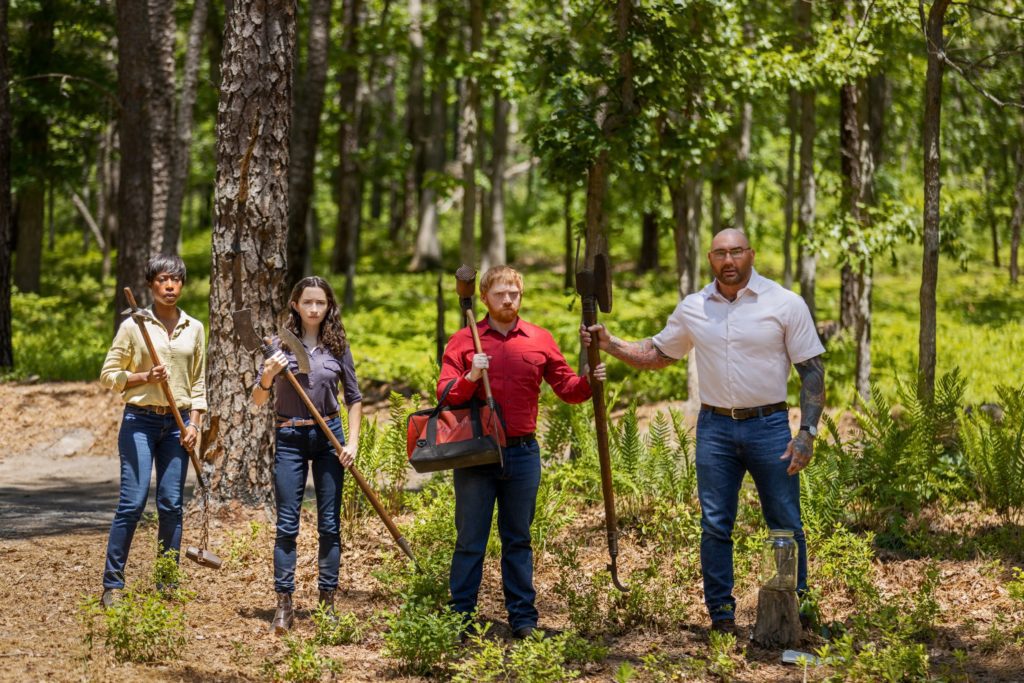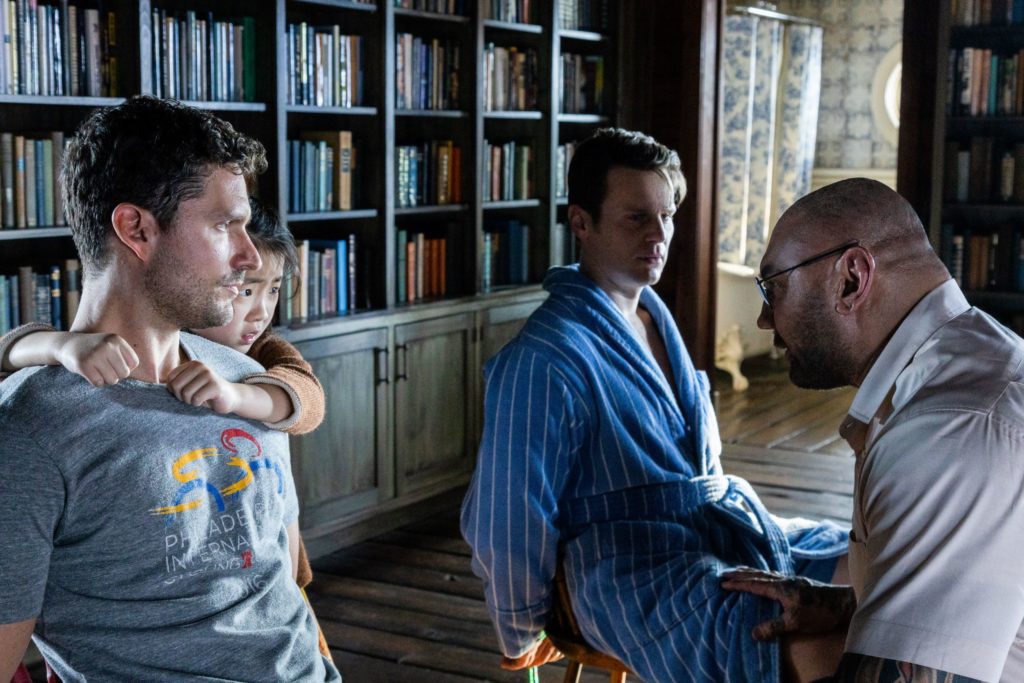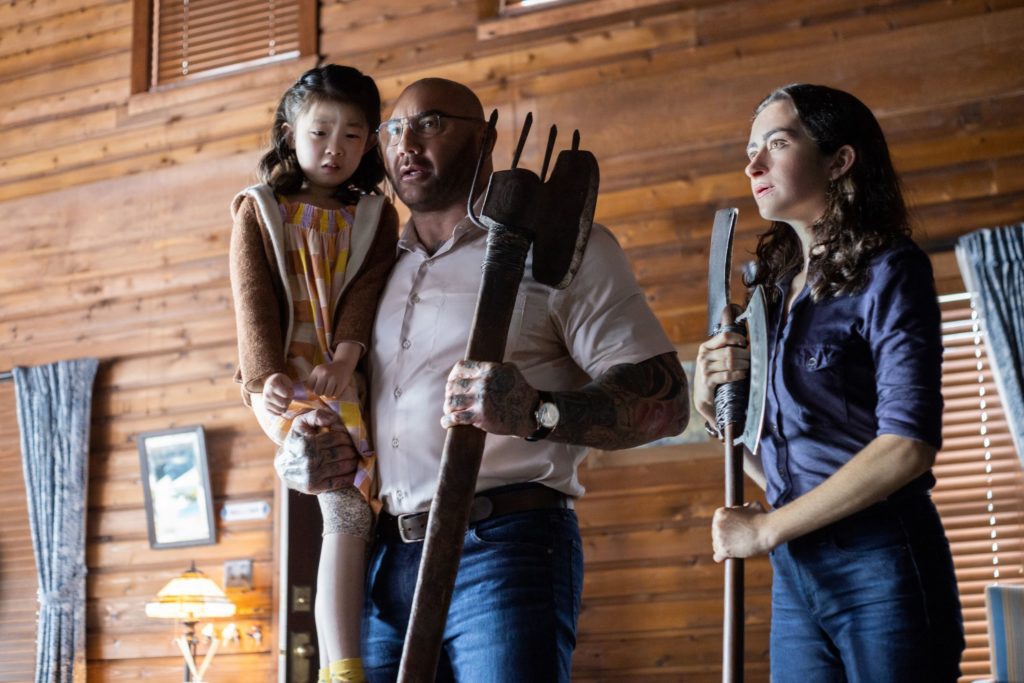
I’m pleased to report that M. Night Shyamalan no longer needs me to defend him. The one-time wunderkind spent years, of course, in punchline purgatory, fueled by backlash against his initial wave of phenomenal success (a backlash aided in no small part, it must be said, by a streak of casual but undeniable racism aimed at the filmmaker). But after bottoming out with a couple of work-for-hire studio pictures, Shyamalan has bounced back with a string of self-financed and remarkably profitable thrillers (his last feature, 2021’s Old, managed to take in nearly $100 million while the first wave of Covid shots was still being distributed). The Shyamalan of 2023 is no longer the “has-been” of the 2000s, but a beloved auteur whose inventive, defiantly idiosyncratic films are rightly greeted with widespread excitement. I’m just happy for the guy, is all.
Shyamalan’s latest, Knock at the Cabin, is clearly the work of a filmmaker with regained confidence. As with Old, Shyamalan has picked from source material which plays to his strengths, and he seems less reliant on what-a-twist gimmickry than he has in ages. The result it both one of the most thrilling films of the director’s career and, crucially, one of the most human.
Knock wastes absolutely no time cutting to the chase: young Wen (the truly adorable Kristen Cui) is playing outside her family’s rented cabin when she is approached by a hulking stranger named Leonard (Dave Bautista). Following some earnest but perfunctory small talk, Leonard informs Wen that he needs to enter the cabin and do something evidently both horrible and necessary. Wen, understandably, runs to her dads, Eric (Jonathan Groff) and Andrew (Ben Aldridge), but the trio are obviously no match for Leonard and his associates (Abby Quinn, Rupert Grint*, and Old’s Nikki Amulka-Bird), each of whom wields a large, intimidating weapon and carries themselves with a grim sense of purpose. Once the family is tied up, Leonard breaks the news to them: within 24 hours, the family must agree to sacrifice one of their own in order to avert the apocalypse. If they refuse, their own lives will be spared, but the rest of the planet will be ravaged, and they will be forced to walk the earth as its sole inhabitants. Eric and Andrew understandably reason that they’ve been abducted by a suicide cult– but, this being a Shyamalan film, they’re soon forced to consider that they may need to take Leonard’s warnings seriously.

Shyamalan’s films, for the most part, have always been more “spooky” than “scary”; even The Sixth Sense, for all its periodic ghost-child jumpscares, never seemed particularly interested in being a “horror movie.” Which makes it all the more shocking, then, when the first twenty minutes or so of Knock at the Cabin develop into a genuinely brutal home-invasion thriller. Following that opening exchange between Leonard and Wen, Shyamalan’s customary distancing framework takes a back seat to some of the most visceral action in Shyamalan’s filmography, the ad hoc Four Horseman making it clear that they mean fucking business. The tension of the scene is amplified by camerawork every bit as off-kilter as that of Old, keeping us every bit as disoriented as Eric and Andrew. Shyamalan has always been a filmmaker who follows his own path, but he here proves that he can be just as effective when playing it straight.
This also applies, to a certain degree, to the story itself. Shyamalan’s work has often been compared to the mind-bending tales of The Twilight Zone, and Knock at the Cabin (based on the novel The Cabin at the End of the World, by Beverly native Paul Tremblay) runs on the same streamlined efficiency as the best stories by series scribes Richard Matheson and Charles Beaumont. But those looking for the trademark “Shyamalan twist” may be disappointed; like many of those stories, Knock draws its power from its allegorical simplicity. The horror is not in wondering what’s going to happen– Leonard fills us in, calmly and comprehensively, within the film’s first act– but in placing ourselves in the shoes of these characters as they grapple with their impossible decision. For all of the film’s apocalyptic spectacle (it doesn’t feel like too much of a spoiler to reveal that things do get pretty dire outside the cabin), this is a film about a small group of people having a series of heartbreaking conversations, and it’s a testament to Shyamalan’s skills that it feels every bit as operatic as any Roland Emmerich smash-em-up.
Given this, it should go without saying that none of this works without the performances of Groff and Aldridge. With next to no exposition (in the beginning, anyway– more on that in a bit), we instantly understand the warmth and parameters of the relationship between these two men and their daughter. They know each other’s weaknesses– Eric has a fiery temper, Andrew is trusting to a fault– and they instinctively know how to compensate for each other in a crisis. Once they grow to accept the gravity of the situation, we can sense, through the pain in their eyes, the genuine affection they have for their little family. It’s a remarkably nuanced portrayal from a filmmaker not always known for his relatable characters; this is easily Shyamalan’s most human film since Signs.

Knock is so assured for the bulk of its running time that I found myself doubly perplexed by its greatest misstep. Throughout the film, Shyamalan periodically cuts away to a series of flashbacks to earlier milestones in Eric and Andrew’s relationship. This presumably serves a greater narrative purpose in Tremblay’s book, but here it cuts against the furious pace of the film, sapping the tension that Shyamalan builds within the closed quarters of the cabin. What’s more, these flashbacks feel unnecessary, both on a narrative level (we don’t learn much from them that we haven’t already gathered from the dialogue) and on an emotional one. The relationships between Eric, Andrew, and Wen are so well sketched that we don’t need to witness the awkward meeting-of-the-parents or the incident that landed Eric in the hospital prior to Wen’s adoption; it’s all right there in their words and on their faces. It’s a well-known screenwriting cliche to “show, don’t tell,” but, in a story like this, telling can be far more effective.
There really is no one out there doing it like M. Night Shyamalan– maybe not ever, and certainly not today. In a cinematic landscape increasingly dominated by IPs and algorithms, Shyamalan makes films that are uniquely his– and, even more remarkably, people go to see them. Knock at the Cabin is the sort of film which shouldn’t be out of the ordinary, thrilling and original and, if not perfect, at least thoroughly personal. In a better world there would be a whole swarm of M. Nights Shyamalan; as it is, I’m happy for the one we’ve got.
* – I don’t know if I’ll be able to fit it organically into this review, but I would be remiss if I failed to comment on the fact that Grint’s character, Redmond, is a surly, homophobic gas company worker from Medford, a revelation that prompted whoops and cheers in my Boston Common preview screening. Grint’s accent is, frankly, all over the place, but he captures the energy of being from Medford to a T.
Knock at the Cabin
2023
dir. M. Night Shyamalan
100 min.
Opens Friday, 2/3 in theaters everywhere

